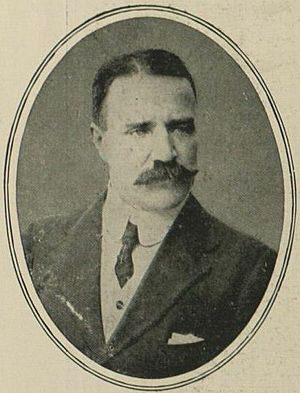Harland Bowden facts for kids
George Robert Harland Bowden (born in 1873, died October 10, 1927) was a British mechanical engineer. He was also a politician for the Conservative Party.
Contents
Early Life and Engineering Start
Harland Bowden was born in Durham. When he was 15, he began training at Lambton Collieries. At the same time, he took classes at Durham College of Science.
In 1890, he moved to South Wales. There, he worked at an ironworks in Tondu to improve his engineering skills. A year later, in 1891, he became an assistant engineer. He was also the main designer at Cyfarthfa Ironworks in Merthyr Tydfil.
Building an Engineering Career
Harland Bowden returned to North East England in 1896. He became the manager of D Selby Bigge and Company. This was an engineering company located in Newcastle.
In 1902, he started his own business. It was called G Harland Bowden and Company. This company was based in Victoria Street, London. His firm specialized in designing and setting up equipment for coal mines and factories. In 1908, he became a member of the Institute of Mechanical Engineers. This showed he was a respected expert in his field.
Military Service
In 1907, Harland Bowden joined the Volunteer Force. He became an officer in the Royal Garrison Artillery. This was a part of the British Army.
Political Journey
Harland Bowden was very active in politics. He was a member of the Conservative Party. In April 1912, he was chosen as the person who hoped to be elected. He wanted to represent the North East Derbyshire area in Parliament.
In April 1914, the current Member of Parliament (MP) for North East Derbyshire passed away. This led to a special election, called a by-election. The election took place on May 20. Harland Bowden won the election and became an MP. He gained the seat for the Conservatives. He won by 314 votes.
World War I and Political Changes
During World War I, Harland Bowden continued to serve. He became the leader of the 17th (Empire) Battalion. This was a special army unit called the Royal Fusiliers.
He kept his seat in Parliament during the war. However, he started to have disagreements with his own Conservative Party. He even took legal action against one of their officials.
In the 1918 general election, he ran for his seat again. This time, he ran as an "Independent Conservative." This meant he was a Conservative but didn't fully agree with his party. The official Conservative candidate had the support of the government. Harland Bowden lost his seat to the Liberal candidate. He finished in third place.
In October 1919, he won money in a legal case. The court decided that someone had said untrue things about him.
Later Political Attempts
By the time of the 1924 general election, Harland Bowden had fixed his ties with the Conservatives. He ran as the party's candidate in North East Derbyshire once more. However, he was not successful. The Labour Party kept the seat.
Later Life and Passing
Harland Bowden passed away suddenly in October 1927. He was 54 years old. He died at his home called "Rodney," in Belmont Hill, St Albans.
 | Misty Copeland |
 | Raven Wilkinson |
 | Debra Austin |
 | Aesha Ash |


